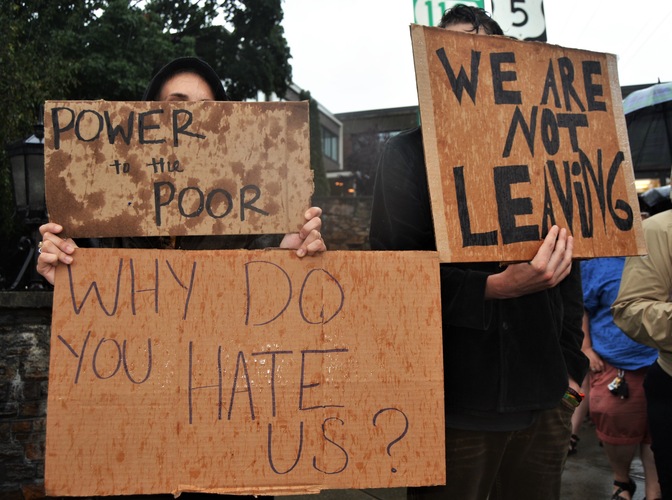BRATTLEBORO — There is immense prejudice in Brattleboro regarding the growing homeless population here. I have experienced it firsthand, and so have many others.
This town likes to bill itself as an all-welcoming community, but those of us who have lived and worked in this town (as I have) rather than merely recreating here know better.
There is a dark side to Brattleboro. The moneyed interests in this town would rather see the homeless and working class population disappear. Why? It's gentrification, plain and simple.
Landlords have already begun to increase their rents, attracting out-of-staters and pushing out locals who can't afford to live in, shop in, or thrive in their own hometown.
For all its craft beer and maple syrup and farm-to-table goodness, there isn't a lot separating Brattleboro from certain trendy parts of Brooklyn or Manhattan, where the locals who can't afford the skyrocketing rents and lack well-paying jobs are damned.
* * *
I previously wrote there is a twin homelessness crisis and housing crisis in Brattleboro, just the same as in New York City. I would love to take a handful of Brattleboro residents who loathe the homeless and drop them off into the middle of Manhattan with a $10 bill in their pocket and watch them scramble to survive on the street for a day, let alone a week or a month or over half a year, as I have done.
Many in Brattleboro wouldn't be able to survive on the streets of New York without financial resources, but they snub the panhandlers in their own backyard.
Vermont has become a place for second-home owners who have made life unaffordable for those born here. They came here in droves, leaving the density of Manhattan's grid plan to indulge in the privilege of locking themselves away in a cabin in the middle of the woods during COVID-19. Locals have not been afforded that luxury.
All of this has led to a spike in homelessness - and with it, an overwhelming disdain for those very same people whose stability has been stripped away from them.
There is a real disconnect between Brattleboro's self image and what it actually is: a bourgeois community for those whose steady diet of kombucha and kale has blinded them to the inequalities in their own town.
* * *
How many panhandlers at the Brattleboro Food Co-op are met with prejudice and disdain? I myself, in the last month alone, have had two separate individuals say to me that the homeless belong in tents - unaware that I am homeless myself.
The socioeconomic divide in Brattleboro could not be starker.
Go ahead, keep buying your artisan bread and cheese and wine while the poor stand outside begging for money, love, and respect.
The prejudice in this community is sickening. This town should be ashamed of its attitude toward the indigent and the poor.
THOMAS PATRICK BRENNAN was a longtime resident of Brattleboro and the West River Valley, as well as New York City. Shortly after writing this piece, he died of sudden complications from melanoma. He was 37 years old. "His chronic homelessness, leading to lack of access to consistent medical care, contributed to his death," writes GennaRose Nethercott, who facilitated a Media Mentoring Project writing workshop for unhoused people and was helping him shape and edit the piece and who submitted it posthumously. "He was a poet, a Catholic, a Vermonter, a friend, and a valued member of our community."
This Voices Viewpoint was submitted to The Commons.
